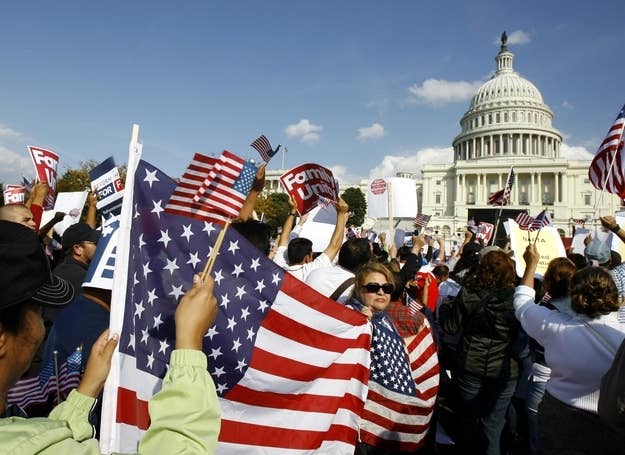
WASHINGTON — Same-sex couples could be left out in the cold when the Senate's comprehensive immigration reform bill is introduced, but LGBT advocates are confident their issues will be addressed in committee.
None of the bipartisan "Gang of Eight" senators have said there is any plan to include bi-national same-sex couples — who are barred by the Defense of Marriage Act from obtaining a green card for a non-citizen spouse — in their immigration reform bill, and one leading advocate has gone so far as to say the decision not to include same-sex couples already has been made.
The measure, introduced for the past several congresses as a standalone bill called the Uniting American Families Act, would allow an American who is part of a bi-national same-sex couple to sponsor his or her non-citizen "permanent partner," a new category for green card sponsorship that would be created by the law. The Obama administration has said it supports the inclusion of the measure in any comprehensive immigration reform.
But with Republicans in the "Gang of Eight" — Sens. John McCain, Jeff Flake, Lindsey Graham and Marco Rubio — expressing doubt and in some cases opposition to its inclusion in reform, none of the Democrats in the coalition — Sens. Chuck Schumer, Michael Bennet, Bob Menendez and Dick Durbin — have pushed the issue as a "make or break" measure for the delicate coalition's compromise draft legislation.
Nonetheless, LGBT advocates joined other immigration reform supporters at a rally on Capitol Hill Wednesday in support of reform. A main reason why there hasn't been much outcry about the measure's inclusion in the base bill is that advocates fully expect the measure to be added into the bill later in the Senate process.
"We have urged Senators to include binational couples in the base bill. However if that does not happen, we will push for an amendment during Senate Judiciary Committee consideration and are confident that amendment will be adopted," Human Rights Campaign spokesman Michael Cole-Schwartz said Thursday. "We will then work with allies to ensure that languages remains in the bill through floor consideration."
Winnie Stachelberg, the Center for American Progress' senior vice president, echoed HRC, saying, "We've heard repeatedly that including UAFA is one of their key priorities during the markup and amendment process, and we believe that [Senate Democrats] will do so."
A similar plan had been discussed regarding the inclusion of LGBT protections in the Elementary and Secondary Education Act (ESEA) reauthorization bill, but an effort to keep bipartisan support for the package coming out of committee resulted in pro-LGBT amendments being withdrawn when a Senate committee considered the ESEA reauthorization back in 2011.
While the coalition dynamics might be part of the reason that the issue hasn't risen to the top of the debate during the crafting of the comprehensive immigration reform bill in the Senate this year, another key reason may be that the law keeping same-sex spouses from sponsoring their non-citizen spouse could be ruled unconstitutional by summer.
Section 3 of the Defense of Marriage Act, which bans the federal government from recognizing same-sex couples' marriages, is before the Supreme Court in Edith Windsor's challenge to the law, and it could be struck down as unconstitutional by the end of June. If that happens, married bi-national same-sex couples should then be eligible for green card sponsorship — although questions would remain about same-sex couples unable to get married.
In the meantime, though, advocates are continuing to push for inclusion for same-sex couples in the congressional legislation.
"There are many members of Congress for whom the Uniting American Families Act is important. They and we will keep pushing for its inclusion at each step of the legislative process — even with the Windsor decision pending. Nobody knows what the outcome of the Supreme Court cases will be, and we have to keep advocating to ensure the broad range of issues affecting LGBT people are included," says Rea Carey, executive director of the National Gay and Lesbian Task Force.
